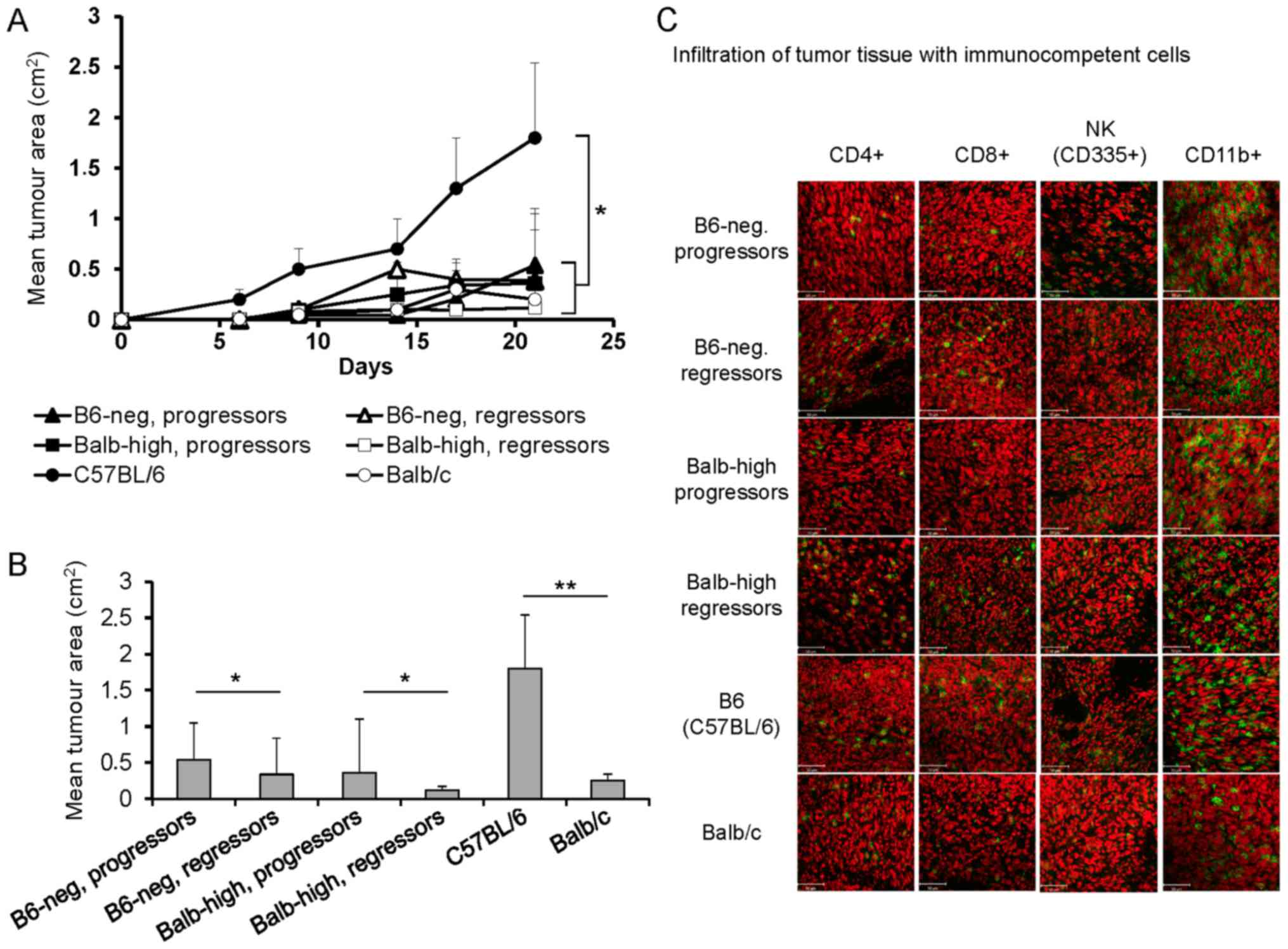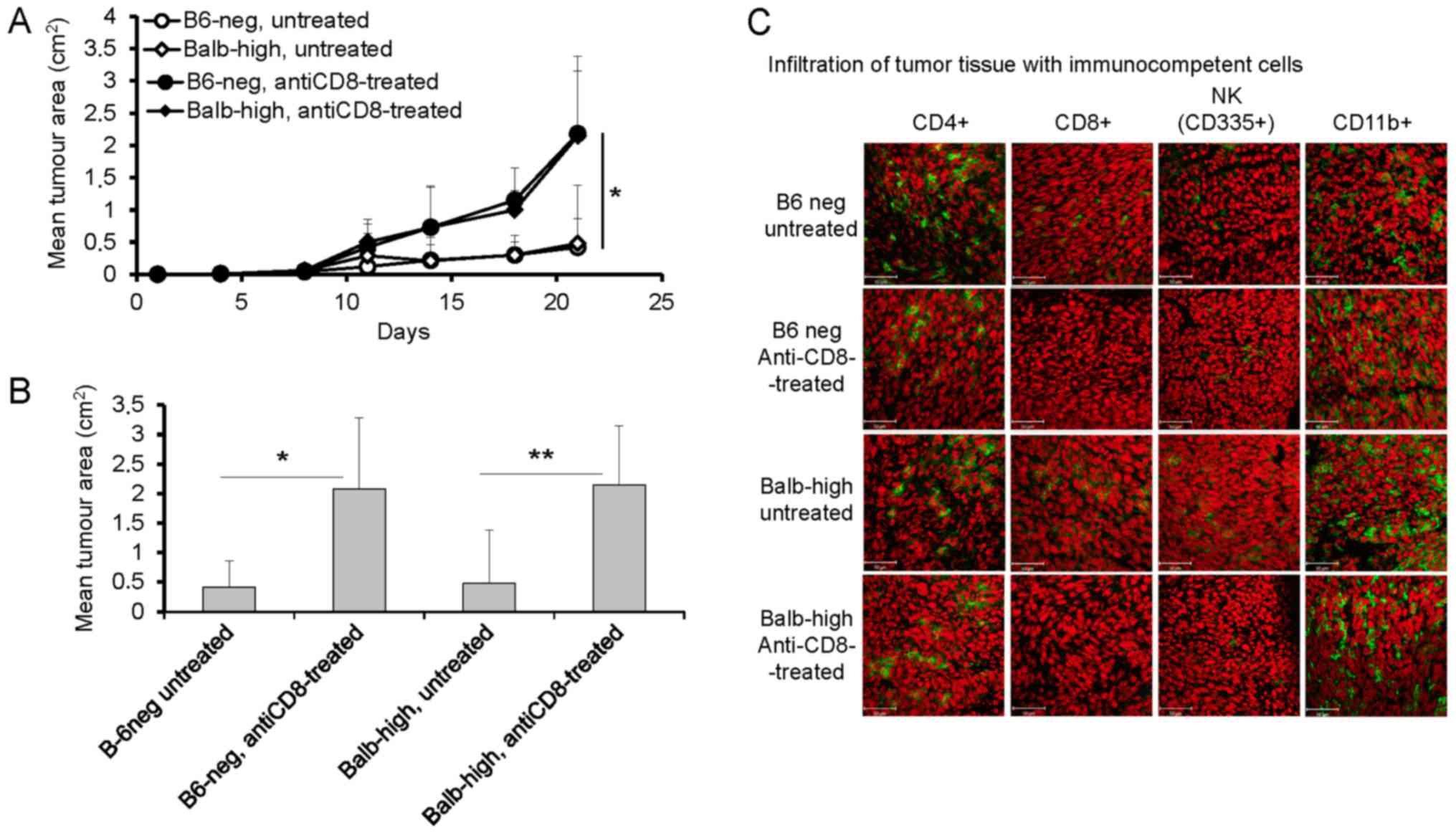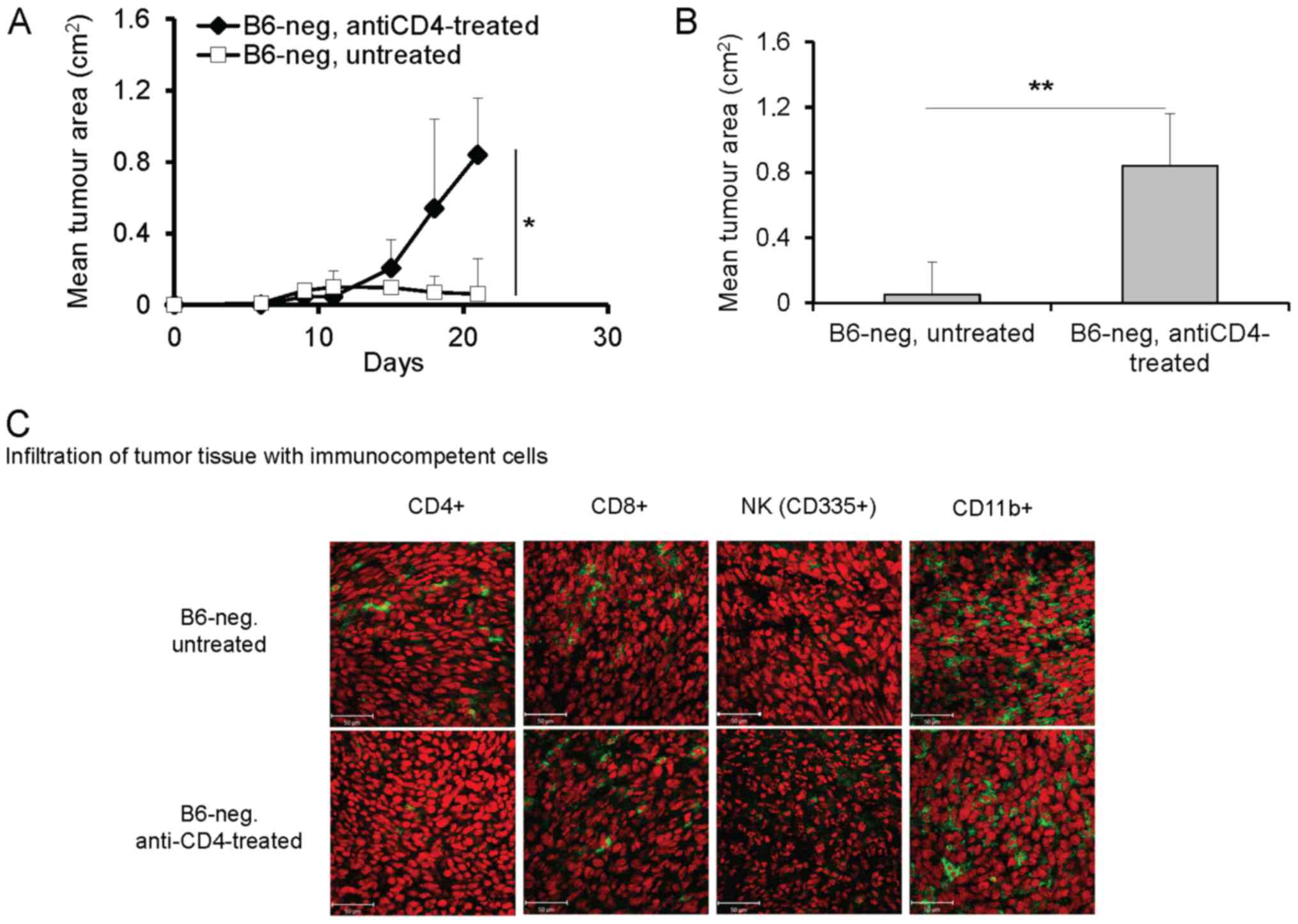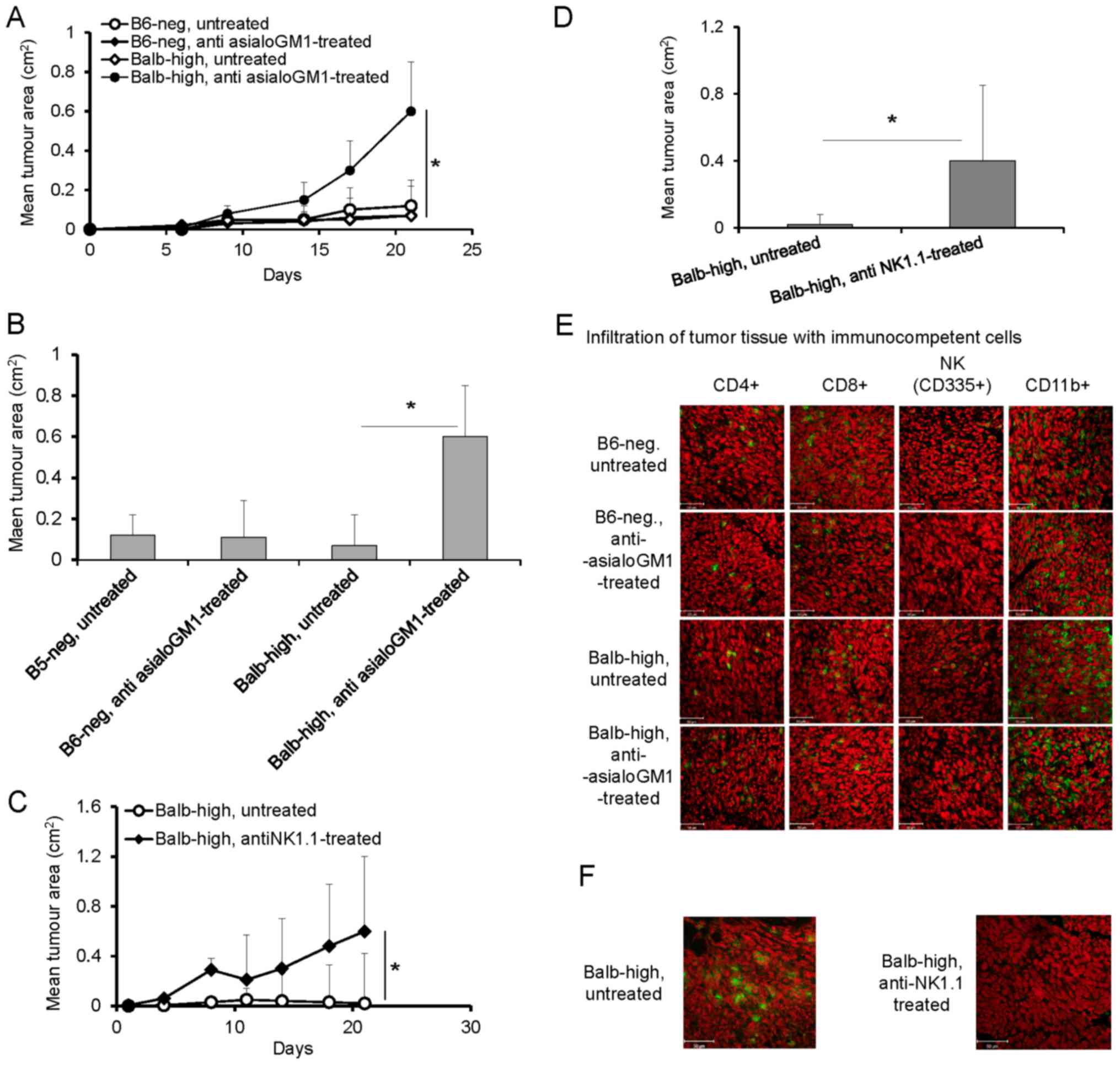|
1
|
Swann JB and Smyth MJ: Immune surveillance
of tumors. J Clin Invest. 117:1137–1146. 2007. View Article : Google Scholar : PubMed/NCBI
|
|
2
|
Xu D, Gu P, Pan PY, Li Q, Sato AI and Chen
SH: NK and CD8+ T cell-mediated eradication of poorly
immunogenic B16-F10 melanoma by the combined action of IL-12 gene
therapy and 4-1BB costimulation. Int J Cancer. 109:499–506. 2004.
View Article : Google Scholar : PubMed/NCBI
|
|
3
|
Ghiringhelli F, Apetoh L, Housseau F,
Kroemer G and Zitvogel L: Links between innate and cognate tumor
immunity. Curr Opin Immunol. 19:224–231. 2007. View Article : Google Scholar : PubMed/NCBI
|
|
4
|
Fišerová A, Richter J, Čapková K, Bieblová
J, Mikyšková R, Reiniš M and Indrová M: Resistance of novel mouse
strains different in MHC class I and the NKC domain to the
development of experimental tumors. Int J Oncol. 49:763–772. 2016.
View Article : Google Scholar : PubMed/NCBI
|
|
5
|
Indrová M, Símová J, Bieblová J, Bubeník J
and Reinis M: NK1.1+ cells are important for the development of
protective immunity against MHC I-deficient, HPV16-associated
tumours. Oncol Rep. 25:281–288. 2011.PubMed/NCBI
|
|
6
|
Indrová M, Bieblová J, Rossowska J,
Kuropka P, Pajtasz-Piasecka E, Bubeník J and Reinis M: HPV
16-associated tumours: IL-12 can repair the absence of cytotoxic
and proliferative responses of tumour infiltrating cells after
chemotherapy. Int J Oncol. 34:173–179. 2009.PubMed/NCBI
|
|
7
|
Mikyšková R, Indrová M, Vlková V, Bieblová
J, Šímová J, Paračková Z, Pajtasz-Piasecka E, Rossowska J and
Reiniš M: DNA demethylating agent 5-azacytidine inhibits
myeloid-derived suppressor cells induced by tumor growth and
cyclophosphamide treatment. J Leukoc Biol. 95:743–753. 2014.
View Article : Google Scholar : PubMed/NCBI
|
|
8
|
Kodumudi KN, Siegel J, Weber AM, Scott E,
Sarnaik AA and Pilon-Thomas S: Immune checkpoint blockade to
improve tumor infiltrating lymphocytes for adoptive cell therapy.
PLoS One. 11:e01530532016. View Article : Google Scholar : PubMed/NCBI
|
|
9
|
Yu P and Fu YX: Tumor-infiltrating T
lymphocytes: Friends or foes? Lab Invest. 86:231–245. 2006.
View Article : Google Scholar : PubMed/NCBI
|
|
10
|
Smahel M, Síma P, Ludvíková V, Marinov I,
Pokorná D and Vonka V: Immunisation with modified HPV16 E7 genes
against mouse oncogenic TC-1 cell sublines with downregulated
expression of MHC class I molecules. Vaccine. 21:1125–1136. 2003.
View Article : Google Scholar : PubMed/NCBI
|
|
11
|
Lin KY, Guarnieri FG, Staveley-O'Carroll
KF, Levitsky HI, August JT, Pardoll DM and Wu TC: Treatment of
established tumors with a novel vaccine that enhances major
histocompatibility class II presentation of tumor antigen. Cancer
Res. 56:21–26. 1996.PubMed/NCBI
|
|
12
|
Mikysková R, Bubeník J, Vonka V, Smahel M,
Indrova M, Bieblová J, Símová J and Jandlová T: Immune escape
phenotype of HPV16-associated tumours: MHC class I expression
changes during progression and therapy. Int J Oncol. 26:521–527.
2005.PubMed/NCBI
|
|
13
|
Símová J, Bubeník J, Bieblová J, Rosalia
RA, Fric J and Reinis M: Depletion of T (reg) cells inhibits
minimal residual disease after surgery of HPV16-associated tumours.
Int J Oncol. 29:1567–1571. 2006.PubMed/NCBI
|
|
14
|
Manning J, Indrova M, Lubyova B, Pribylova
H, Bieblova J, Hejnar J, Simova J, Jandlova T, Bubenik J and Reinis
M: Induction of MHC class I molecule cell surface expression and
epigenetic activation of antigen-processing machinery components in
a murine model for human papilloma virus 16-associated tumours.
Immunology. 123:218–227. 2008.PubMed/NCBI
|
|
15
|
Rossowska J, Pajtasz-Piasecka E, Szyda A,
Zietara N and Duś D: Tissue localization of tumor antigen-loaded
mouse dendritic cells applied as an anti-tumor vaccine and their
influence on immune response. Folia Histochem Cytobiol. 45:349–355.
2007.PubMed/NCBI
|
|
16
|
Hadrup S, Donia M and Thor Straten P:
Effector CD4 and CD8 T cells and their role in the tumor
microenvironment. Cancer Microenviron. 6:123–133. 2013. View Article : Google Scholar : PubMed/NCBI
|
|
17
|
Luckheeram RV, Zhou R, Verma AD and Xia B:
CD4+T cells: Differentiation and functions. Clin Dev
Immunol. 2012:9251352012. View Article : Google Scholar : PubMed/NCBI
|
|
18
|
Koretzky GA: Multiple roles of CD4 and CD8
in T cell activation. J Immunol. 185:2643–2644. 2010. View Article : Google Scholar : PubMed/NCBI
|
|
19
|
Smyth MJ, Crowe NY and Godfrey DI: NK
cells and NKT cells collaborate in host protection from
methylcholanthrene-induced fibrosarcoma. Int Immunol. 13:459–463.
2001. View Article : Google Scholar : PubMed/NCBI
|
|
20
|
Bendelac A, Savage PB and Teyton L: The
biology of NKT cells. Annu Rev Immunol. 25:297–336. 2007.
View Article : Google Scholar : PubMed/NCBI
|
|
21
|
Símová J, Indrová M, Bieblová J, Mikysková
R, Bubeník J and Reinis M: Therapy for minimal residual tumor
disease: Beta-galactosylceramide inhibits the growth of recurrent
HPV16-associated neoplasms after surgery and chemotherapy. Int J
Cancer. 126:2997–3004. 2010.PubMed/NCBI
|
|
22
|
Nishikado H, Mukai K, Kawano Y, Minegishi
Y and Karasuyama H: NK cell-depleting anti-asialo GM1 antibody
exhibits a lethal off-target effect on basophils in vivo. J
Immunol. 186:5766–5771. 2011. View Article : Google Scholar : PubMed/NCBI
|
|
23
|
Tomar MS, Kumar S, Kumar S, Gautam PK,
Singh RK, Verma PK, Singh SP and Acharya A: NK cell effector
functions regulation by modulating nTreg cell population during
progressive growth of Dalton's lymphoma in mice. Immunol Invest.
11:1–17. 2017.
|
|
24
|
da Cunha A, Antoniazi Michelin M and
Cândido Murta EF: Phenotypic profile of dendritic and T cells in
the lymph node of Balb/C mice with breast cancer submitted to
dendritic cells immunotherapy. Immunol Lett. 177:25–37. 2016.
View Article : Google Scholar : PubMed/NCBI
|
|
25
|
Zalli A, Bosch JA, Goodyear O, Riddell N,
McGettrick HM, Moss P and Wallace GR: Targeting β2 adrenergic
receptors regulate human T cell function directly and indirectly.
Brain Behav Immun. 45:211–218. 2015. View Article : Google Scholar : PubMed/NCBI
|
|
26
|
Sato Y, Shimizu K, Shinga J, Hidaka M,
Kawano F, Kakimi K, Yamasaki S, Asakura M and Fujii SI:
Characterization of the myeloid-derived suppressor cell subset
regulated by NK cells in malignant lymphoma. Oncoimmunology.
4:e9955412015. View Article : Google Scholar : PubMed/NCBI
|
|
27
|
Gabrilovich DI and Nagaraj S:
Myeloid-derived suppressor cells as regulators of the immune
system. Nat Rev Immunol. 9:162–174. 2009. View Article : Google Scholar : PubMed/NCBI
|
|
28
|
Mikyšková R, Indrová M, Símová J, Bieblová
J, Bubeník J and Reiniš M: Genetically modified tumour vaccines
producing IL-12 augment chemotherapy of HPV16-associated tumours
with gemcitabine. Oncol Rep. 25:1683–1689. 2011.PubMed/NCBI
|
|
29
|
Gabrilovich DI, Ostrand-Rosenberg S and
Bronte V: Coordinated regulation of myeloid cells by tumours. Nat
Rev Immunol. 12:253–268. 2012. View
Article : Google Scholar : PubMed/NCBI
|
|
30
|
Umansky V and Sevko A: Tumor
microenvironment and myeloid-derived suppressor cells. Cancer
Microenviron. 6:169–177. 2013. View Article : Google Scholar : PubMed/NCBI
|
|
31
|
Sevko A and Umansky V: Myeloid-derived
suppressor cells interact with tumors in terms of myelopoiesis,
tumorigenesis and immunosuppression: Thick as thieves. J Cancer.
4:3–11. 2013. View Article : Google Scholar : PubMed/NCBI
|


















